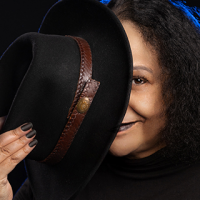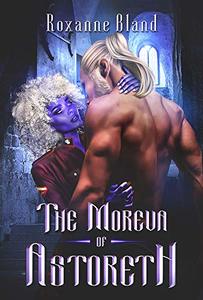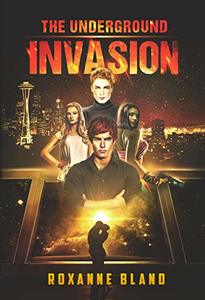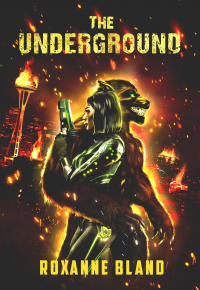Roxanne Bland Interview Published on: 14, Feb 2020
 Growing up in Washington, D.C, which is your favorite childhood memory?
Growing up in Washington, D.C, which is your favorite childhood memory?
There are so many! The standout, I think, is during the summer I’d sneak out of the house—about 2 or 3 in the morning—and settle on the couch on our side porch, and listen to the sounds of the night. It was so wonderfully quiet. I could hear the breeze soughing through the tree leaves, or the occasional yowl from a feral cat. Back then, D.C. wasn’t much more than a sleepy little town, and nothing operated or was open 24 hours, not even the 7-11 (they were open from 7 AM to 11 PM, hence, its name). I’d watch the sunrise, and then return to my room before my parents woke.
What attracted you the most about the museums of the Smithsonian Institution?Everything. All of it. There’s so much to see. You know, if you really want to see all of the Smithsonian, plan on staying at least a month and go every day. It really is that huge. There are several new museums I haven’t visited, like the National Museum of the American Indian, the National Museum of African-American History and Culture, The National Holocaust Museum, and more. Your tax dollars work hard at the Smithsonian, and it’s worth every penny. What surprises most visitors, I think, is there’s no admission fee. And you get spoiled because of it. The first time I went to a museum in a different city and was charged admission, I was quite offended.
What was the reaction of your family when you decided to write a book? What was the acting force that pushed you to write?I’ve written stories, off and on, since childhood. I didn’t think much of it—I had other interests—it was just something fun to do when I wasn’t doing anything else. So when I announced I’d written a novel, my family was pleased but it wasn’t a big deal. What started me writing was boredom. Sheer boredom. I’d fallen ill, and was unable to get out and around for about a month. You know when you’re really ill, and you reach that stage where you don’t sleep all the time but you’re still too sick to get up? That’s where I was. And even though I love to read, there’s only so much reading I can do—day in and day out. I’d gotten a new laptop and I thought maybe writing some stuff would help the time pass more quickly. I’d been reading a series, and the characters were really annoying me, so I decided to write a take-off on that. I showed it to a friend of mine who was my partner in crime when it came to reading, and she suggested I keep going with it. I didn’t, but started a different book, and the rest, as they say, is history.
What do you love the most about stories that are mashups of paranormal urban fantasy, romance, and science fiction?I can do so much more with the story. Not being restricted to one genre opens up a much wider world. There’s a scene in Invasion where the characters are involved in a terrific space battle, and the ship takes a bad hit, crippling the shields. The mage character runs to the drive deck and gathers up all the wires to the blasted server, and chants a spell to get them back on line. Magick and science working together. And my mashups don’t always mix the three genres. One of my books only has two. As for future works I can throw other genres in the mix—horror, thriller, whatever—and see what comes out.
What was your major in college? How do you think it has contributed to your career as a writer?My college major was Government, which is sort of like political science. As far as I can tell, it hasn’t contributed a thing. If any of my college courses have contributed to my writing, it would be all those theology classes.
What was your main source of inspiration for Invasion?The preceding book, The Underground. I hadn’t really intended to write a sequel, but after thinking about it, I realized there were several threads in The Underground that hadn’t been resolved. Like, what about Kurt’s unrequited love for Parker? What about Melera? Does she just blast off into space, or does she stay on Earth? And Garrett—what are the consequences of her machinations to get Parker to join her and Kurt in a tryst? We know from The Underground the spell didn’t work completely. What effect did it have on the three of them? Those questions really needed to be answered, and frankly, I was curious to see how everything would fall out.
Who inspired the character of the powerful alpha male of the werewolf pack, Parker Berenson in "The Underground"?No one. He’s not an amalgam of a bunch of different people, either. Really, he’s my dream man—a total sweetheart—protective but not jealous, kind and loving, has a fantastic and wicked sense of humor, a strong sense of decency and justice—the kind of guy you bring home to meet your mother and even your father likes him. He’s no pushover, though. He’ll kill you, but only if you deserve it.
What were the key challenges you faced when writing the book, "The Underground?" How much did you research for this book?The only research involved was the locale. I’ve never been to Seattle, so I pored over several different maps, learning about the different neighborhoods and landmarks, reviewed weather and sunrise/sunset charts, things like that. I also talked to people who live or have spent a lot of time in the city, getting their take on its peculiar culture, nightlife and so on. One man I found particularly helpful is a policeman who recently retired from the force, who told me much about Seattle’s crime history and rate—the types of crimes, the most common crimes, and whatnot. I didn’t use actual street names, though.
As for the paranormals, I have my own ideas about who they are and how they survive. Most books I’ve read more or less gloss over the challenges a paranormal has to contend with to survive in a society where humans outnumber them by magnitudes, and who’d like nothing more to eradicate them. In “reality,” they do what they have to do to survive, and sometimes that means human notions of morality have to go out the window. I suppose that was the biggest challenge—I had to put my moralistic assumptions aside and put myself in their shoes. Imagine what it would be like to live in an active war zone and you’re fighting to survive. It doesn’t matter that you might be a neutral, you’re still getting shot at. What if you’re faced with a choice where the moral thing to do would mean your certain death, and a horrible death at that? Would you do the moral thing and die, or the immoral thing and live? Personally, I don’t know what I’d do. But The Underground’s paranormals are faced with that reality every day of their lives. That’s why the novel’s tagline is “There’s no room for morals when survival is at stake.”
What kind of books do you like to read in your spare time? Who is one of your favorite authors?My tastes are wide-ranging. For fiction, I’m fond of horror, thrillers, and of course, science fiction and fantasy. These can either be novels or anthologies. The short story is a fantastic literary form. Literary fiction, sometimes—depends on the book. Snow Falling on Cedars and Memoir of a Geisha I really enjoyed. I love reading fairy tales. My non-fiction reading tends toward theoretical physics, cosmology, astrophysics, that kind of thing. I love reading history, all kinds and whatever time periods. My favorite author and poet is Edgar Allan Poe. In my humble opinion, nobody can touch him.
Which is the one character from your books you wish was real?All of them. I love my children equally.
How do you decide if an idea is feasible or not?Any idea is feasible. The question is whether it works in the context of the story. If I’m writing a hard science fiction novel, faster-than-light travel or instantaneous—that is, real time—communication can’t exist. If I’m writing science fantasy, they can. In two of my books, instantaneous communication between a transmission point in one galaxy and a receiving point in another galaxy happens through quantum entanglement. In the real world, if you believe what information theorists have to say, that can’t exist because entangled particles can’t carry information. If they did, it means the waves carrying that information are traveling faster than the speed of light, which Einsteinian physics forbids.
What is the one message you would like to give the youth of the world?Learning will take you only so far, but imagination will take you everywhere.
Do you have any plans to write in some other genre than romance? If yes, which one would it be?That question doesn’t really apply to me, because I don’t write romance as a single genre. Romance is a subplot of my stories, not THE story. At most, it is the vehicle for a character’s self- discovery. Having said that, I do want to try my hand at something completely different than mashup. I’ve ideas for two alternative histories, one involving Alan Turing and the other Nikola Tesla.
What are you currently working on? Which place in the world would you like to set your next story in?At the moment, I have three projects going simultaneously. One, a novelette entitled The Final Victim, is set in The Underground’s alternate Seattle. The other two, The Moreva of Astoreth and its sequel, When Gods Die, are set on Peris, a planet in another galaxy. Of course, there are more in the queue. My next project, as yet untitled, is a dystopia set on a future Earth.
How has your experience at AllAuthor been?I’m still exploring all the site has to offer, but so far, so good. I particularly like that I’m able to make banners and gifs for advertising elsewhere. They make a nice touch for newsletters and other advertising venues. In the future, I plan to put all of my books on AllAuthor.
Share Roxanne Bland's interview
Author Roxanne Bland's dark and engaging novels pull the reader in right from the start. Her world-building is impressive, giving the reader the sense they are actually in the story. Roxanne Bland's Invasion has been called "the craziest and most entertaining mash-up" of paranormal urban fantasy, romance and science fiction.




